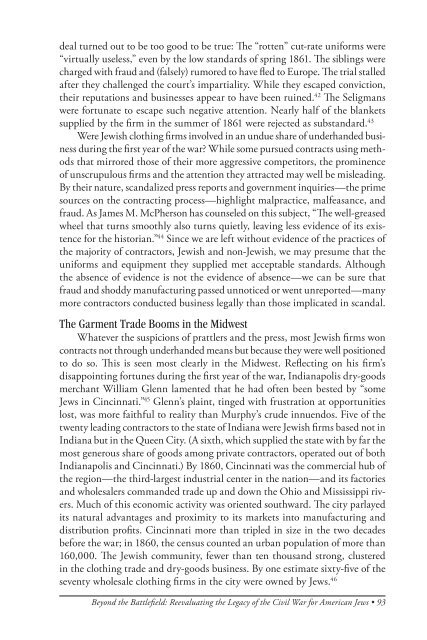American Jewish Archives Journal, Volume 64, Numbers 1 & 2
American Jewish Archives Journal, Volume 64, Numbers 1 & 2
American Jewish Archives Journal, Volume 64, Numbers 1 & 2
Create successful ePaper yourself
Turn your PDF publications into a flip-book with our unique Google optimized e-Paper software.
deal turned out to be too good to be true: The “rotten” cut-rate uniforms were<br />
“virtually useless,” even by the low standards of spring 1861. The siblings were<br />
charged with fraud and (falsely) rumored to have fled to Europe. The trial stalled<br />
after they challenged the court’s impartiality. While they escaped conviction,<br />
their reputations and businesses appear to have been ruined. 42 The Seligmans<br />
were fortunate to escape such negative attention. Nearly half of the blankets<br />
supplied by the firm in the summer of 1861 were rejected as substandard. 43<br />
Were <strong>Jewish</strong> clothing firms involved in an undue share of underhanded business<br />
during the first year of the war? While some pursued contracts using methods<br />
that mirrored those of their more aggressive competitors, the prominence<br />
of unscrupulous firms and the attention they attracted may well be misleading.<br />
By their nature, scandalized press reports and government inquiries—the prime<br />
sources on the contracting process—highlight malpractice, malfeasance, and<br />
fraud. As James M. McPherson has counseled on this subject, “The well-greased<br />
wheel that turns smoothly also turns quietly, leaving less evidence of its existence<br />
for the historian.” 44 Since we are left without evidence of the practices of<br />
the majority of contractors, <strong>Jewish</strong> and non-<strong>Jewish</strong>, we may presume that the<br />
uniforms and equipment they supplied met acceptable standards. Although<br />
the absence of evidence is not the evidence of absence—we can be sure that<br />
fraud and shoddy manufacturing passed unnoticed or went unreported—many<br />
more contractors conducted business legally than those implicated in scandal.<br />
The Garment Trade Booms in the Midwest<br />
Whatever the suspicions of prattlers and the press, most <strong>Jewish</strong> firms won<br />
contracts not through underhanded means but because they were well positioned<br />
to do so. This is seen most clearly in the Midwest. Reflecting on his firm’s<br />
disappointing fortunes during the first year of the war, Indianapolis dry-goods<br />
merchant William Glenn lamented that he had often been bested by “some<br />
Jews in Cincinnati.” 45 Glenn’s plaint, tinged with frustration at opportunities<br />
lost, was more faithful to reality than Murphy’s crude innuendos. Five of the<br />
twenty leading contractors to the state of Indiana were <strong>Jewish</strong> firms based not in<br />
Indiana but in the Queen City. (A sixth, which supplied the state with by far the<br />
most generous share of goods among private contractors, operated out of both<br />
Indianapolis and Cincinnati.) By 1860, Cincinnati was the commercial hub of<br />
the region—the third-largest industrial center in the nation—and its factories<br />
and wholesalers commanded trade up and down the Ohio and Mississippi rivers.<br />
Much of this economic activity was oriented southward. The city parlayed<br />
its natural advantages and proximity to its markets into manufacturing and<br />
distribution profits. Cincinnati more than tripled in size in the two decades<br />
before the war; in 1860, the census counted an urban population of more than<br />
160,000. The <strong>Jewish</strong> community, fewer than ten thousand strong, clustered<br />
in the clothing trade and dry-goods business. By one estimate sixty-five of the<br />
seventy wholesale clothing firms in the city were owned by Jews. 46<br />
Beyond the Battlefield: Reevaluating the Legacy of the Civil War for <strong>American</strong> Jews • 93
















